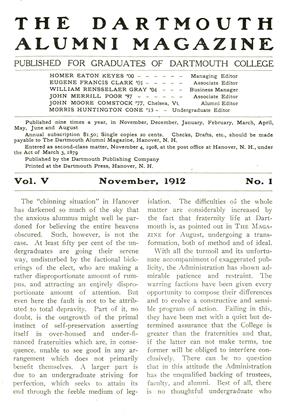ADDRESS TO STUDENTS ON THE OCCASION OF OF THE OPENING OF COLLEGE SEPTEMBER 19, 1912
President Ernest Fox NicholsADDRESS TO STUDENTS ON THE OCCASION OF OF THE OPENING OF COLLEGE SEPTEMBER 19, 1912 President Ernest Fox Nichols
On behalf of trustees and faculty, it is my pleasant privilege to welcome you here this morning at the opening exercises of a new year.
Those of you who now return to the College after the summer's vacation will notice some significant changes in the outward aspects of the campus. These changes have been undertaken and hurried through in your absence, to meet the expanding needs of the College in the more effective discharge of its duties.
The one intent of all that has been done has been to provide improved material surroundings and facilities which should make your work more efficientshould make your every effort count more toward the ends which you are here to achieve. If this intention is realized in the results of your work, the labor and money which the improvements have cost will have been worthily spent.
Those of you who enter our doors today for the first time it is a satisfaction to welcome to a home more commodious than that which earlier greeted your predecessors.
In the College all signs point to a year of large and steady accomplishment. In the realization of this, the College expects every one of its members to do his whole part ungrudgingly and with enthusiasm.
By an unusual circumstance con- nected with the present political cam- paign, public notice is just now directed to the bearing of college training upon leadership. The unusual circumstance is this: the six chief candidates for the offices of President and Vice-President of the United States are not only college graduates, but all six are at present serving upon the governing boards of colleges and universities. The three presidential and one of the vice-presidential candidates are, moreover, members of the Phi Beta Kappa. Five of these six men were graduated within the two years between 1878 and 1880, at a time when the proportion of college and noncollege men was even smaller than it is today.
It is noteworthy in passing that the contention often heard now, and as often heard forty years ago, that our colleges stifle individuality, is not proven in this case. For a wider diversity of temperament, personality, and opinion than these six men display, it would be unreasonable to ask.
The academic connection of our presidential candidates, together with much else that is happening around us, shows a steady drift of leadership into the hands of men who know—men of trained understanding and intelligence.
The larger qualities which make for leadership are self mastery, moral earnestness, force of character, self reliance, an alert intelligence and power to win the confidence of other .men.
The leader must have enthusiasm, and that of a contagious quality. His roots must go deep, shallowness of mind or heart is fatal. The man who would lead must both know men and things. He must have an overmastering object in life, and must know the way to it. He must have wide sympathies and ally himself not with men's weaknesses, but with their strength.
He must convince men that the end he seeks is something they want done, and they must believe that he knows a better way to do it than they. Sympathy, understanding, force,—the will to serve and to share—he must have. Definiteness of purpose, definiteness of knowledge and conscious power must be written large upon him, so that all may read.
The best leadership is a generous selfforgetful business. You cannot play at leadership nor act it self-consciously. To permanently succeed it must be genuine, must be your whole work, your life. The end must be everything, and the man must be ready to stand or fall by the judgment, the righteousness, the humanity of his cause.
What, then, has the college to do with all this? It has everything to do with it. Mental and moral preparation, truth and righteousness are its business. Yet college men are not all leaders. Some are incapable of even the lesser manifestations of leadership, for our colleges, like all other associations of men, draw to themselves their full share of soft material. You cannot impress enduring characters on soft material; but we have our young men of firmer, finer stuff as well,—men of power in the making. It is to these the College entrusts her future, and it is upon these she does her perfect work for leadership in the world.
From college, each takes whatever he has the capacity and the will to receive. The assimilation of truth, and the hard work necessary to a mastery of the sources of power, must ever be voluntary.
The College seeks to stimulate, to inspire, to strengthen its members, but the larger work which lies beyond the kindling you alone can do.
 View Full Issue
View Full Issue














